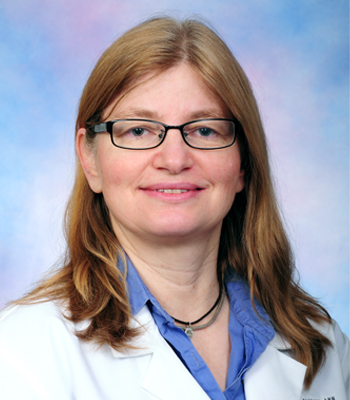Karin List
Address
540 E. Canfield, Room 6332 Detroit, MI 48201Office Address
540 E. Canfield, Room 6332
Detroit, MI 48201
Mentoring
Previous Graduates:
Carly Martin (2022)
Andrew Murray (2018) - Postdoctoral Fellow at Duke University Medical Center, Durham, NC
Gina Zoratti (2014) - Executive Director of the Translational and Clinical Research Center at Henry Ford Health System, Detroit, MI
Department
Pharmacology and Oncology
Research Description
Extracellular proteases can degrade extracellular matrix proteins and reshape the tissue microenvironment as well as cleave and activate signaling molecules such as growth factors and their receptors. These processes are essential for normal physiological tissue development, remodeling, and repair. On the flip side, tissue malfunction and tissue destruction due to dysregulated extracellular proteolysis characterize many pathological conditions including cancer. Extracellular proteolytic processes are critically involved in tumor growth, invasion, and dissemination of cancer cells to other organs. We are particularly interested in a family of cell-surface-anchored proteases: the type II transmembrane serine proteases (TTSPs) and their role in tissue remodeling during epithelial development and carcinogenesis. Understanding the physiological role of extracellular proteases in tissue development and homeostasis is important in order to pinpoint how dysregulated proteolysis can cause or contribute to cancer progression. The motivation behind parallel investigations of normal physiology and pathology is the idea that carcinogenesis often involves pathways, including proteolytic pathways, that are important in normal development and have gone awry in cancer. Generation and characterization of mouse models, including models of human breast and prostate cancer, play an integral role in our research. We use knock-out and transgenic mice for selected extracellular proteases and protease inhibitors as unique tools to identify critical proteolytic pathways in health and disease.
Selected Publications
Murray AS, Hyland TE, Sala-Hamrick KE, Mackinder JR, Martin CE, Tanabe LM, Varela FA, List K. The cell-surface anchored serine protease TMPRSS13 promotes breast cancer progression and resistance to chemotherapy. Oncogene. 2020; Aug 31. doi: 10.1038/s41388-020-01436-3. Online ahead of print.
Varela FA, Foust VL, Hyland TE, Sala-Hamrick KE, Mackinder JR, Martin CE, Murray AS, Todi SV, List K. TMPRSS13 promotes cell survival, invasion, and resistance to drug-induced apoptosis in colorectal cancer. Scientific Reports. 2020;10:13896.
Martin CE, List K. Cell surface-anchored serine proteases in cancer progression and metastasis. Cancer Metastasis Rev. 2019;38:357-87.
Murray AS, Varela FA, Hyland TE, Schoenbeck AJ, White JM, Tanabe LM, Todi SV, List K. Phosphorylation of the type II transmembrane serine protease, TMPRSS13 in Hepatocyte Growth Factor Activator Inhibitor-1 and 2-mediated cell surface localization.J Biol Chem. 2017;292:14867-84.
Tanabe LM, List K. The role of type II transmembrane serine protease-mediated signaling in cancer. FEBS J. 2017;284:1421-36.
Zoratti GL, Tanabe LM, Hyland TE, Duhaime MJ, Colombo É, Leduc R, Marsault E, Johnson MD, Lin CY, Boerner J, Lang JE, List K. Matriptase regulates c-Met mediated proliferation and invasion in inflammatory breast cancer. Oncotarget. 2016;7:58162-73.
Murray AS, Varela FA, List K. Biol Chem. Type II transmembrane serine proteases as potential targets for cancer therapy. 2016; 397:815-26.
Education/Training
Ph.D. (2000) University of Copenhagen, Denmark
Postdoctoral training: NIH/NIDCR, Bethesda, Maryland
